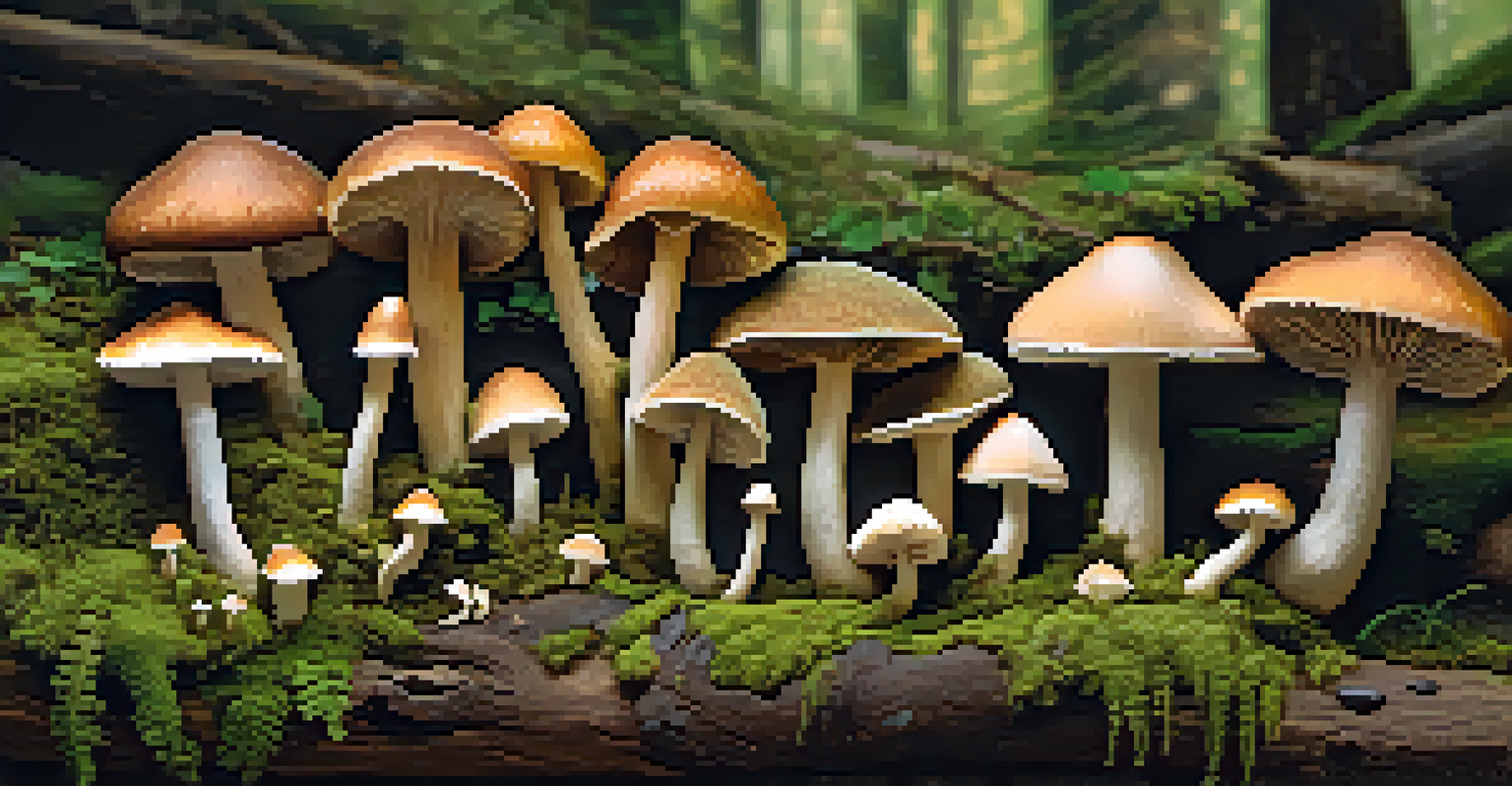Nature's Healing Power: Hallucinogens and Mental Well-being

Understanding Hallucinogens and Their Origins
Hallucinogens are substances that alter perception and mood, often leading to profound experiences. Many of these compounds are derived from natural sources, such as plants and fungi, like psilocybin mushrooms and peyote. These substances have been used for centuries in various cultures for healing and spiritual growth, highlighting their deep roots in human history.
Psychedelics can help us to understand ourselves in ways that traditional therapies often cannot.
While modern science has often treated these substances with skepticism, recent research has begun to uncover their potential benefits for mental health. The shift towards understanding the therapeutic uses of hallucinogens marks an important evolution in how we view mental wellness. By exploring their origins, we can appreciate their significance in both traditional and modern contexts.
As we delve deeper into the world of hallucinogens, it's essential to recognize their complex relationship with the mind. They don’t just induce altered states; they can also facilitate profound insights into one’s mental health, making them a valuable area of study for improving well-being.
The Role of Nature in Hallucinogenic Experiences
Nature plays a crucial role in the experiences induced by hallucinogens. Many users report that being in natural settings enhances their perceptions, leading to feelings of interconnectedness and awe. This connection to the environment can amplify the effects of hallucinogens, creating a unique synergy between the substance and the natural world.

Imagine walking through a lush forest while under the influence of a hallucinogen—the colors are more vibrant, sounds more pronounced, and every rustle of leaves feels like a conversation with nature. This deepened sensory experience can lead to a profound sense of peace and well-being, often helping individuals confront internal struggles and emotions. Nature becomes not just a backdrop, but a vital participant in the healing journey.
Hallucinogens and Mental Health
Recent research highlights the therapeutic potential of hallucinogens for conditions like depression and anxiety.
Moreover, studies have indicated that nature itself can be therapeutic, reducing anxiety and improving mood. When combined with hallucinogens, this natural setting can foster transformative experiences that promote mental health. It’s a reminder of how intertwined our well-being is with the world around us.
Therapeutic Benefits of Hallucinogens for Mental Health
Research has shown that hallucinogens can provide significant therapeutic benefits for various mental health conditions, including depression, anxiety, and PTSD. In controlled settings, substances like psilocybin have been used to help patients confront and process their emotions, often leading to breakthroughs in their treatment. This potential for healing has sparked a renewed interest in psychedelic therapy among mental health professionals.
The greatest healing therapy is friendship and love.
For instance, clinical trials have demonstrated that a guided session with psilocybin can result in lasting improvements in mood and outlook. Patients often describe their experiences as life-changing, granting them a new perspective on their struggles. Such findings challenge the stigma surrounding these substances and highlight their potential as legitimate tools for mental health care.
However, it’s essential to approach these treatments with caution and respect. Professional guidance and a supportive environment are crucial for ensuring safety and maximizing the benefits of hallucinogens in therapeutic contexts. As we explore their potential, we must also prioritize responsible use and informed consent.
Personal Stories: Transformative Experiences with Hallucinogens
Personal narratives often illustrate the profound impact hallucinogens can have on mental well-being. Many individuals share stories of how a single experience led to a significant shift in their perspectives, allowing them to overcome deep-seated fears or traumas. These anecdotes provide valuable insight into the transformative power of these substances when experienced in a supportive setting.
For example, one individual recounted how a guided psilocybin session helped him confront his anxiety about death. Through vivid imagery and feelings of interconnectedness, he emerged with a renewed sense of peace and acceptance. Such stories not only highlight the potential for personal growth but also encourage others to consider the therapeutic possibilities of hallucinogens.
Nature Enhances Experiences
Experiencing hallucinogens in natural settings can amplify feelings of interconnectedness and promote healing.
These narratives remind us that healing is not just a clinical process; it’s a deeply personal journey. The emotional resonance of these experiences underscores the importance of empathy and understanding when discussing hallucinogens and mental health, fostering an environment where individuals feel safe to share and explore.
The Science Behind Hallucinogens and Mental Health
At the heart of the discussion on hallucinogens and mental health is the science that explains how these substances affect the brain. Research indicates that hallucinogens can promote neuroplasticity, allowing the brain to form new connections and pathways. This can be particularly beneficial for individuals struggling with rigid thought patterns often associated with mental health issues.
Neuroplasticity essentially means that the brain can adapt and change, which is a cornerstone of effective therapy. By facilitating this process, hallucinogens may help individuals break free from cycles of negative thinking and emotional distress. Understanding this scientific basis can make the conversation about hallucinogens more approachable and relatable.
Furthermore, the brain’s serotonin receptors play a significant role in how hallucinogens induce their effects. By interacting with these receptors, substances like LSD and psilocybin can create altered states of consciousness that foster introspection and emotional release. This connection between brain chemistry and mental health opens exciting avenues for future research and therapeutic practices.
Navigating Risks and Ethical Considerations
While hallucinogens offer promising therapeutic potential, it’s crucial to navigate the associated risks and ethical considerations. These substances can induce intense experiences, which may not be suitable for everyone, especially those with underlying mental health issues. It’s essential to approach their use with caution and ensure that individuals have the proper support systems in place.
Moreover, the legal status of hallucinogens varies widely across regions, creating a complex landscape for research and treatment. Understanding the legal implications is vital for both practitioners and patients alike. As the field evolves, ongoing discussions about regulation and safe practices are necessary to ensure that these substances are used responsibly.
Ethics in Hallucinogen Use
Navigating the risks and ethical considerations is essential for safe and responsible use of hallucinogens in therapy.
Ethical considerations also extend to the broader societal impact of hallucinogen use. As interest in their therapeutic potential grows, it’s important to engage in conversations about accessibility, cultural appropriation, and informed consent. By addressing these issues, we can work towards a more equitable understanding and application of hallucinogens in mental health treatment.
The Future of Hallucinogens in Mental Health Treatment
The future of hallucinogens in mental health treatment looks promising, with a growing body of research supporting their therapeutic benefits. As more studies are conducted, there is hope for a paradigm shift in how mental health is approached, moving towards more holistic and integrative practices. This evolution could lead to increased acceptance and incorporation of hallucinogens in mainstream therapy.
Additionally, as society becomes more open to alternative treatments, we may see a rise in the number of clinics specializing in psychedelic therapy. These spaces could provide safe environments for individuals seeking to explore their mental health challenges with the aid of hallucinogens. Such developments could democratize access to these treatments, allowing more people to benefit from their potential.

However, this future must be approached with a commitment to safety, ethics, and individual well-being. As we stand at this intersection of science and spirituality, it’s crucial to ensure that the journey towards integrating hallucinogens into mental health care is guided by compassion and respect for the complexities of the human experience.